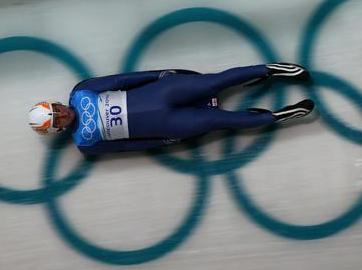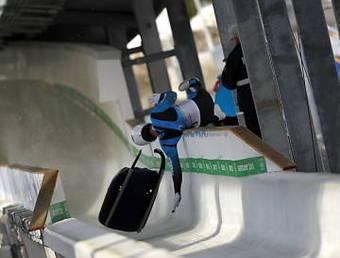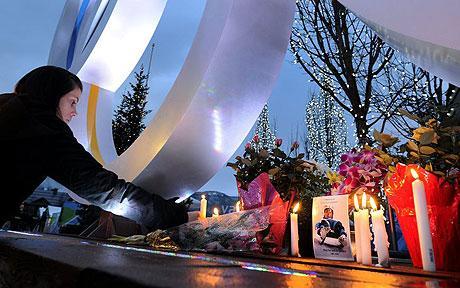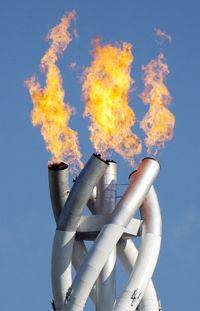 Winter Olympics 2010: Nodar Kumaritashvili warned of luge course dangers. Nodar Kumaritashvili’s father has revealed his son rang him before he was killed during luge training at the Vancouver Olympics to say he thought the track was too dangerous.
Winter Olympics 2010: Nodar Kumaritashvili warned of luge course dangers. Nodar Kumaritashvili’s father has revealed his son rang him before he was killed during luge training at the Vancouver Olympics to say he thought the track was too dangerous.
Kumaritashvili died last Friday when he crashed into a metal pillar after losing control of his sled at more than 90 mph during a practice run. The course has since been altered, but David Kumaritashvili, a former luger himself, said his son had voiced concerns about the track.
“He called me before the Olympics, three days ago, and he said, ‘Dad, I’m scared of one of the turns’,” David said.
“I said put your legs down on the ice to slow down but he said if he started the course he would finish it. … He was brave.
Kumaritashvili died last Friday when he crashed into a metal pillar after losing control of his sled at more than 90 mph during a practice run. The course has since been altered, but David Kumaritashvili, a former luger himself, said his son had voiced concerns about the track.
“He called me before the Olympics, three days ago, and he said, ‘Dad, I’m scared of one of the turns’,” David said.
“His whole life he wanted to be an athlete, it was his dream to be at the Olympics. He was so excited about going; I’ve never seen him so excited in his entire life. He was ready for the Olympics, he was a real clean-living sportsman.”
Adamant he would not watch the video footage of his son’s death, David said his family was at a complete loss as to why the tragedy happened.
Nodar’s death has been recorded as an accident by a coroner in Vancouver, but David believes the course allowed for competitors to travel too fast.
“I don’t know anything about why it happened,” he said. “I don’t know if it was the track or if it was a mistake. But I know that he should never have been going that fast; that kind of speed is too much in this sport.”
 Georgian Luger Dies after Horrifying Crash, that occurred to a Georgian Luger, Nodar Kumaritsashvili, during a trial run. Coming around one of the bends, his luge flung him off the track, sending him somersaulting through the air and ultimately, into a steel pillar on the other side. We should warn you that this video is not for the faint of heart.
Georgian Luger Dies after Horrifying Crash, that occurred to a Georgian Luger, Nodar Kumaritsashvili, during a trial run. Coming around one of the bends, his luge flung him off the track, sending him somersaulting through the air and ultimately, into a steel pillar on the other side. We should warn you that this video is not for the faint of heart.Apparently, after repeated CPR attempts, Nodar was airlifted by helicopter off the course, and later pronounced dead. He was 21-years old and competing in his first Olympics.
This will almost certainly bring about some heated debates regarding the safety of the luge courses. They are lacquered up to the max and have caused numerous accidents in the past, including a less serious crash on the same turn earlier today. It’s a damn shame that a fatal accident such as this will finally get them to reconsider the safety standards.
The trial courses have been shut down and the federation is currently in meetings all day — presumably discussing what the next move should be.
The last time someone has died on the course during the games was in 1964 when both an Australian skier died and, what do you know, a British luger were involved in life ending accidents
 Debate: do the Winter Olympics push athletes too far? The death of Georgian luger Nodar Kumaritashvili has served as a reminder of the risks winter athletes face. With safety measures being called into question and the course being altered as a result of the tragedy – are competitors being pushed too far in their bid to win a gold medal?
Debate: do the Winter Olympics push athletes too far? The death of Georgian luger Nodar Kumaritashvili has served as a reminder of the risks winter athletes face. With safety measures being called into question and the course being altered as a result of the tragedy – are competitors being pushed too far in their bid to win a gold medal?
Questions have been raised regarding the safety of athletes at the Winter Olympics, with Great Britain’s Adam Rosen admitting male lugers should not have encountered a course as fast and extreme as they did in Canada. In the days before Nodar-Kumaritashvili’s death there were more than 12 reported crashes on the course – one of which left Roma nian athlete Violeta Stramaturaru unconscious and ultimately led to her withdrawing from the competition. Fifteen months ago, when athletes were permitted restricted access to the Canadian course, it is understood there were a total of 73 crashes, but few changes appear to have been made to the course. Last Thursday, Australian luger Hannah Campbell-Pegg suggested that things had gone too far in certain sports – particularly luge.“I think they are pushing it a little too much,” she said. “To what extent are we just little lemmings that they just throw down a track and we’re crash-test dummies?” she said. “I mean, this is our lives.”In December, American snowboarder Kevin Pearce was critically injured during a half-pipe practice session. He was attempting a “Double McTwist 1260” manoeuvre pioneered by reigning Olympic champion Shaun White, who says high-risk tricks in his sport are not getting out of hand. “We drive around in cars and that’s pretty dangerous but we still do it.”
Do winter sports need an element of danger to survive, or should the safety of competitors be the most important thing?
 The Winter Olympic Games are a winter multi-sport event held every four years. They feature winter sports held on snow or ice, such as Alpine skiing, cross-country skiing, figure skating, bobsledding and ice hockey. Cross-country skiing, figure skating, ice hockey, Nordic combined, ski jumping, and speed skating have been competed at every Winter Olympics since 1924. Other athletic events have been added as the Games have progressed. Some of these events, such as luge, short track speed skating, and freestyle skiing have earned a permanent spot on the Olympic programme. Others, like speed skiing, bandy, and skijöring have been demonstration sports but never incorporated officially as an Olympic sport.
The Winter Olympic Games are a winter multi-sport event held every four years. They feature winter sports held on snow or ice, such as Alpine skiing, cross-country skiing, figure skating, bobsledding and ice hockey. Cross-country skiing, figure skating, ice hockey, Nordic combined, ski jumping, and speed skating have been competed at every Winter Olympics since 1924. Other athletic events have been added as the Games have progressed. Some of these events, such as luge, short track speed skating, and freestyle skiing have earned a permanent spot on the Olympic programme. Others, like speed skiing, bandy, and skijöring have been demonstration sports but never incorporated officially as an Olympic sport.
Fewer countries participate in the Winter Olympics than the Summer Olympics. The first Winter Olympics were held in Chamonix, France in 1924. Prior to this, figure skating and ice hockey had been events at the Summer Olympics. The Games were held every four years from 1924 until 1940 when they were interrupted by World War II. The Winter and Summer Games resumed in 1948 and were celebrated on the same year until 1992. At that time the Winter Games split from the Summer Games, and were begun to be celebrated on alternating even years. The first Winter Olympic Games to be held on this new schedule was in 1994 in Lillehammer, Norway.
The Winter Games have undergone significant changes since their inception. The rise of television as a global medium for communication has greatly enhanced the profile of the Games. It has also created an income stream in the form of the sale of broadcast rights and advertising, which has become very lucrative. This has allowed outside interests, such as television companies and corporate sponsors, to influence various aspects of the Games. The International Olympic Committee (IOC) has had to address several internal scandals, and the use of performance enhancing drugs by Winter Olympic athletes. The Winter Games have also been used by countries to demonstrate the claimed superiority of their political systems.
Many countries have hosted the Winter Olympics multiple times. The United States has hosted the Games four times, more than any other country. France has been host three times. Austria, Canada, Italy, Japan, Norway, and Switzerland have hosted the Games twice. The next Games will be hosted by Sochi, Russia in 2014. This will be the first time that Russia hosts the Winter Olympic Games.
In 2003 the IOC awarded the 2010 Winter Olympics to Vancouver, thus allowing Canada to host its second Winter Olympics. With a population of more than 2.5 million people, Vancouver will be the largest metropolitan area to ever host a Winter Olympic Games. Vancouver is a low-altitude, seaport city with a relatively mild oceanic climate. Most of the venues will be located in the Vancouver metropolitan area, with the exception of the alpine, Nordic, and sliding events, which will be held in Whistler.
The decision for the location of the 2014 Winter Olympics was made on 4 July 2007. Sochi, Russia, was elected as the host city over the other two finalists: Salzburg, Austria, and Pyeongchang, South Korea. Sochi will be the first city with a subtropical climate to host the Winter Games. The Olympic Village and Olympic Stadium will be located on the Black Sea coast. All of the mountain venues will be 50 kilometres (30 mi) away in the alpine region known as Krasnaya Polyana.
Games
Year
Host
Dates
Nations
Competitors
Sports
Events
Ref
Total
Men
Women
I
1924
 Chamonix, France
Chamonix, France25 January – 5 February
16
258
247
11
6
16
[6]
II
1928
 St. Moritz, Switzerland
St. Moritz, Switzerland11–19 February
25
464
438
26
4
14
[12]
III
1932
 Lake Placid, United States
Lake Placid, United States4–15 February
17
252
231
21
4
14
[14]
IV
1936
 Garmisch-Partenkirchen, Germany
Garmisch-Partenkirchen, Germany6–16 February
28
646
566
80
4
17
[16]
1940
Originally awarded to Sapporo, Japan, cancelled because of World War II.
1944
Originally awarded to Cortina d’Ampezzo, Italy, cancelled because of World War II.
V
1948
 St. Moritz, Switzerland
St. Moritz, Switzerland30 January – 8 February
28
669
592
77
4
22
[136]
VI
1952
 Oslo, Norway
Oslo, Norway14–25 February
30
694
585
109
4
22
[24]
VII
1956
 Cortina d’Ampezzo, Italy
Cortina d’Ampezzo, Italy26 January – 5 February
32
821
687
134
4
24
[29]
VIII
1960
 Squaw Valley, United States
Squaw Valley, United States18–28 February
30
665
521
144
4
27
[137]
IX
1964
 Innsbruck, Austria
Innsbruck, Austria29 January – 9 February
36
1091
892
199
6
34
[33]
X
1968
 Grenoble, France
Grenoble, France6–18 February
37
1158
947
211
6
35
[36]
XI
1972
 Sapporo, Japan
Sapporo, Japan3–13 February
35
1006
801
205
6
35
[138]
XII
1976
 Innsbruck, Austria
Innsbruck, Austria4–15 February
37
1123
892
231
6
37
[43]
XIII
1980
 Lake Placid, United States
Lake Placid, United States13–24 February
37
1072
840
232
6
38
[139]
XIV
1984
 Sarajevo, Yugoslavia
Sarajevo, Yugoslavia8–19 February
49
1272
998
274
6
39
[48]
XV
1988
 Calgary, Canada
Calgary, Canada13–28 February
57
1423
1122
301
6
46
[50]
XVI
1992
 Albertville, France
Albertville, France8–23 February
64
1801
1313
488
7
57
[53]
XVII
1994
 Lillehammer, Norway
Lillehammer, Norway12–27 February
67
1737
1215
522
6
61
[56]
XVIII
1998
 Nagano, Japan
Nagano, Japan7–22 February
72
2176
1389
787
7
68
[62]
XIX
2002
 Salt Lake City, United States
Salt Lake City, United States8–24 February
77
2399
1513
886
7
78
[65]
XX
2006
 Turin, Italy
Turin, Italy10–26 February
80
2508
1548
960
7
84
[69]
XXI
2010
 Vancouver, Canada
Vancouver, Canada12–28 February
ongoing event
XXII
2014
 Sochi, Russia
Sochi, Russia7–23 February
future event
XXIII
2018
TBD (2011)
TBD
future event
XXIV
2022
TBD (2015)
TBD
future event
Note: Unlike the Summer Olympics, the cancelled 1940 Winter Olympics and 1944 Winter Olympics are not included in the official Roman numeral counts for the Winter Games. While the official titles of the Summer Games actually count Olympiads (which occur even if the Games do not), the official titles of the Winter Games only count the Games themselves.
VIỆT THỨC [Source: Telegraph.co.uk & combined doc.]
 The Winter Olympic Games are a winter multi-sport event held every four years. They feature winter sports held on snow or ice, such as Alpine skiing, cross-country skiing, figure skating, bobsledding and ice hockey. Cross-country skiing, figure skating, ice hockey, Nordic combined, ski jumping, and speed skating have been competed at every Winter Olympics since 1924. Other athletic events have been added as the Games have progressed. Some of these events, such as luge, short track speed skating, and freestyle skiing have earned a permanent spot on the Olympic programme. Others, like speed skiing, bandy, and skijöring have been demonstration sports but never incorporated officially as an Olympic sport.
The Winter Olympic Games are a winter multi-sport event held every four years. They feature winter sports held on snow or ice, such as Alpine skiing, cross-country skiing, figure skating, bobsledding and ice hockey. Cross-country skiing, figure skating, ice hockey, Nordic combined, ski jumping, and speed skating have been competed at every Winter Olympics since 1924. Other athletic events have been added as the Games have progressed. Some of these events, such as luge, short track speed skating, and freestyle skiing have earned a permanent spot on the Olympic programme. Others, like speed skiing, bandy, and skijöring have been demonstration sports but never incorporated officially as an Olympic sport.VIỆT THỨC [Source: Telegraph.co.uk & combined doc.]











































